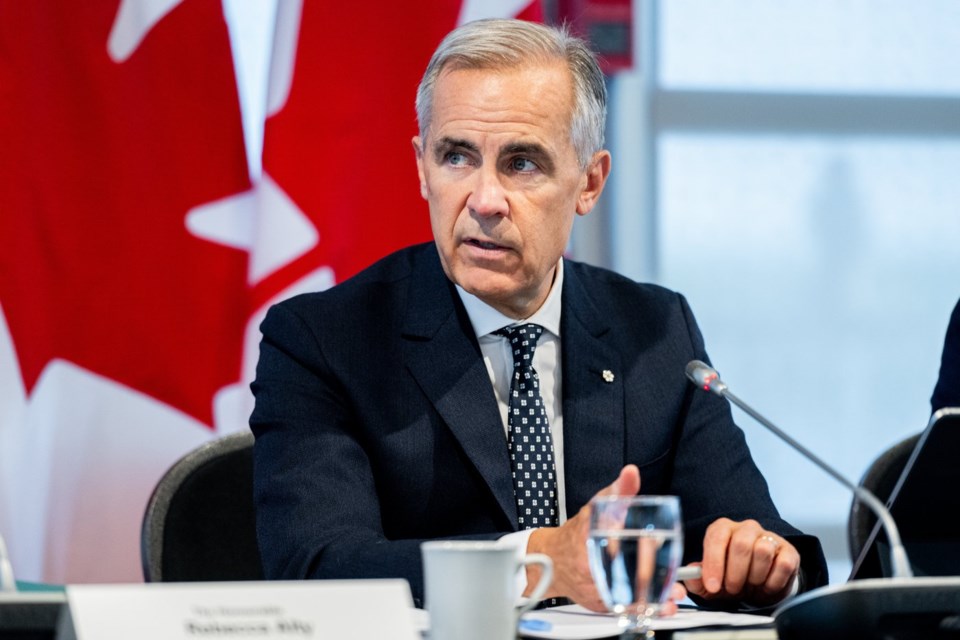TORONTO — Canada is making progress on "small" tariff deals with the U.S. for key sectors, Prime Minister Mark Carney said Wednesday after revealing he'd had a recent phone call with U.S. President Donald Trump.
Carney disclosed the call during a scrum with reporters outside a cabinet retreat in Toronto. He said he spoke with Trump "at length" Monday evening on a wide range of issues, including trade, geopolitics and employment.
He described it as a "good conversation" but also warned there is no guarantee Ottawa will secure any of the deals under discussion as the Trump administration works to squeeze the Canadian economy to obtain trade concessions.
"Don't expect immediate white smoke on one of these strategic sectors, but that's the kind of conversation that we're having," Carney said.
The Vatican sends a plume of white smoke up from the chimney of the Sistine Chapel to signal that a new Pope has been chosen.
While Carney did not specify which key sectors are the subjects of trade talks, the sectors targeted by U.S. tariffs include steel, aluminum, forestry products and automobiles.
The Prime Minister's Office did not provide a readout of the phone call — or even disclose on Monday or Tuesday that the two leaders had spoken at all, which is the standard practice. The PMO sent a statement to media after Carney spoke Wednesday that said the two leaders are in "close and frequent communication."
Carney said Canada has a team of senior bureaucrats in Washington — including the head of the public service, Michael Sabia — who are speaking with their U.S counterparts on key trade issues.
Carney's cabinet met behind closed doors Wednesday at a Toronto hotel — part of its preparations for the upcoming fall sitting of Parliament and for continuing negotiations with the Americans on tariffs.
The upcoming review of Canada's free trade pact with the U.S. and Mexico is also on the agenda for the cabinet retreat, which will run through the end of Thursday.
"We need to lay the groundwork for that review," Carney said.
The prime minister and his team will also discuss the upcoming fall budget during their meetings. The budget is normally released in the spring but Carney has delayed it until October.
Carney described the budget as "both" a spending document and a plan for fiscal belt-tightening. He said the federal government has been growing its overall spending at a rate of over 7 per cent a year on average for more than a decade.
"That's twice the rate of growth of the economy, on average. It's not a sustainable situation. So we need to rein in spending. We need to find efficiencies," Carney said, adding that will be one of the key topics for his cabinet over the next two days.
"The government needs to spend precious taxpayer dollars as carefully as possible. So, big focus on reducing our operational spending — think of it as our day-to-day spending — while at the same time, catalyzing enormous investment in those big projects and building homes."
Conservative Leader Pierre Poilievre said Carney might have promised to spend less, but the prime minister has ramped up government spending since taking office.
"So far, Mark Carney has not found a single penny in new savings," Poilievre told a news conference in Mississauga, Ont. on Wednesday morning, before Carney made his comments.
Since taking office, Carney has unveiled major spending plans for national defence to help Canada meet the NATO defence spending benchmark of the equivalent of 2 per cent of GDP per year.
Poilievre predicted that Carney's government will produce larger deficits than those of former prime minister Justin Trudeau.
"It doesn't matter what he says. It matters what he does," the Conservative leader said.
Carney's cabinet is also hearing from panels of speakers from outside government during the retreat.
Jean-Marc Léger, president of the polling firm Léger, said he told Carney's cabinet that tariffs and Trump have slid down the list of Canadians' concerns, while the high cost of living has risen back to the top.
"A year ago, tariffs was the No. 1 issue and that's one of the reasons why this government had been elected. Today, that's changed," he told media after the meeting. "Tariffs rank fourth in Canada. This is important. People are less afraid of tariffs and Trump."
Carney's honeymoon period with voters continues as broad support for his government remains, Léger and another pollster from his firm said.
But the firm found voters are also concerned about the direction of the economy and want to see action on that front.
Léger said Canadians generally support the government's plan to spur the construction of major industrial projects, but Ottawa needs to tell Canadians why the plan is needed — rather than explain how it will go about kick-starting development.
Léger was the only speaker who presented to cabinet to come out and speak with reporters on camera afterward.
Scotiabank's chief economist Jean-Francois Perreault was expected to give a presentation to cabinet on the country's economic outlook.
On the Canada-U.S. relationship, ministers are also expected to hear from Kevin Roberts — head of the Heritage Foundation, a right-leaning U.S.-based think tank — and from Kevin Rudd, Australia's former prime minister and current ambassador to the U.S.
Cabinet is also set to hear from representatives of pension fund OMERS, MDA Space and Hydro One.
The cabinet's fall legislative planning session included Sen. Pierre Moreau, parliamentary secretaries Kody Blois and Rachel Bendayan and Liberal caucus chair James Maloney.
— With files from Emilie Bergeron
This report by The Canadian Press was first published Sept. 3, 2025
Kyle Duggan, The Canadian Press



